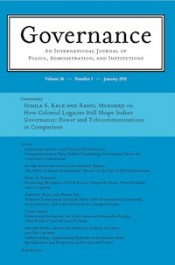Fukuyama asks: What is governance?
In a new commentary published this week, Francis Fukuyama asks: How should we measure governance? The question is important but neglected: “Everyone is interested in studying political institutions that limit or check power . . . but very few people pay attention to the institution that accumulates and uses power, the state.” Existing measures, he says, are “woefully inadequate.”
What’s needed, Fukuyama argues, is a method of gauging the ability of governments to make and enforce rules, and deliver services, regardless of whether that government is democratic or not. The critical dimensions of executive branch quality are capacity and autonomy, Fukuyama says. Other considerations, such as impartiality, have limitations as indicators of state quality.
It’s also important to recognize variations in governance within nations, Fukuyama adds. Existing measures like Transparency International’s Corruptions Perceptions Index “treat single sovereign states as the unit of analysis. Yet it is obvious that the quality of governance varies enormously within countries.”
Fukuyama says that his commentary is intended “to serve as a basis for discussion. As we cannot measure what we cannot adequately conceptualize, we have to start with the concept first.” Free access to the commentary.
Francis Fukuyama is the Olivier Nomellini Senior Fellow at the Freeman Spogli Institute for International Studies at Stanford University. His books include The Origins of Political Order (2011) and The End of History and the Last Man (1992).

Frankly speaking, I have found the Fukuyama’s commentary confused, misleading and unuseful. Fukuyama seems to be unaware of the long lasting debate and of the huge literature on the governance turn which have been developing in the last 20 years.
His definition of governance simply reduces the concept of governance to the concept of government. And it cannot be accepted. Also those scholars of governance who maintain a significant role of governments in governance dynamics cannot accept this rude and unintelligible reduction. What he wants to measure is simply the government/State capacity or effectiveness. So the commentary should be renamed, from “What is governance?’ to ” What is government effectiveness?”.
And also if this would be the case, the piece seems very basic in its analysis on how to measure government effectiveness and in its consideration of the most relevant independent and intervenient variables (State effectiveness cannot be based only on the level of bureaucratic autonomy; here politics matters together with the features of the policy-making: the grade of openess of the process; the presence of multi-venues; the professial background of the policy-makers; the social perception of the problem, etc).
So much ado about what?
Giliberto capano
March 11, 2013 at 10:50 pm